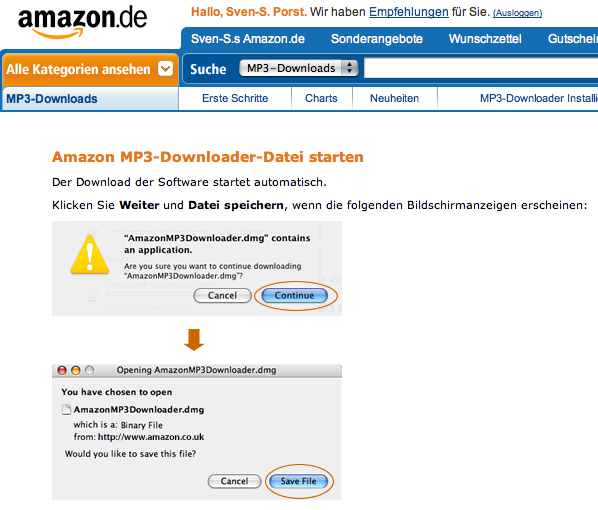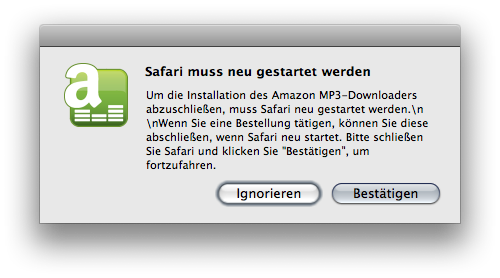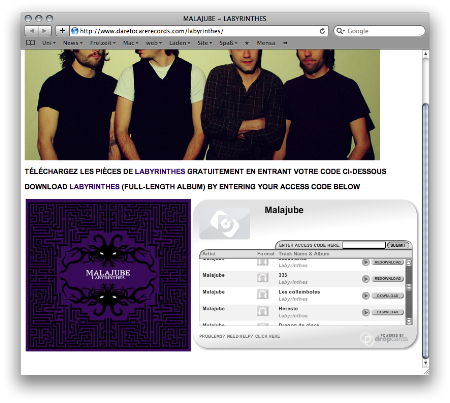amazon MP3¶
2165 words
This started out as a quick review of amazon’s MP3 download offers in Germany, but it degenerated to a slightly broader music downloading review, including the iTunes Music Store, commentary on iTunes and other ways of buying music.
iTunes Music Store
While I can appreciate the convenience of the iTunes Music Store, I have never been terribly impressed. It may claim to want to do all the right things: easy access to music, tight integration with your music library, ultimately making it easier to do the ‘right’ thing and buy that song you just heard and liked - rather than grabbing a copy of it ‘from the internet’.
As a person who loves his music and music library, I soon found the iTunes music store to be not that perfect. Not only does it sell files crippled by ‘DRM’ - a dysfunctionality that they’re finally trying to phase out, naturally with an upgrade charge to fix the songs you may already have -, the quality of the metadata and catalogue on the iTunes Music store isn’t particularly good either. Your typical Apple fanboy will blame ‘the labels’ for that because they let dyslexic interns enter the metadata into the music store. But that’s missing the point. It’s Apple’s store and they can decide what they sell. Obviously they consider the current quality delivered by music labels ‘good enough’.
The badness of metadata exists in many way. Sometimes tagging is downright inappropriate, say with album titles and artist names being plainly wrong, sometimes even titles are wrong, e.g. for MP3 karaoke where I’ll bet you won’t download MP3 files; that last example also shows how many opportunities are missed there: Shouldn’t karaoke downloads come with text displayed at the right speed in this high quality online world? But I’ll go further: Why do album metadata need to be typographically poor and contain ‘dumb’ quotation marks, apostrophes and ellipses? Your usual vinyl or CD cover art will get those details right. This issue actually opens a completely new can of worms and reveals that sites like last.fm also need to think a bit harder about normalising artist, album and song names.
A further point I keep disliking about the iTunes Music Store is that it shifts Apple’s focus for iTunes. The application started out as a kick-ass music library and player. In early versions it gained plenty of cool features and easily outdid any other music software. Over time, hard drives grew enough to let us rip our entire CD collections into the application, leading to collections of thousands or tens of thousands of songs - I have even heard of people with hundreds of thousands of songs in iTunes. This increased the music management challenges iTunes faces, but the application was hardly improved in that respect. Most of the relevant features seemed to be present in iTunes 4 already and most improvements since then were to accomodate the ever growing range of iPods and the iTunes Music Store. While iTunes still beats most other music player applications without problems that isn’t because it is so great today, it is because those other applications are so bad that they still haven’t reached the quality iTunes had half a decade ago. As the iTunes Music Store and support for iPods and (what the heck‽) a telephone puts Apple’s profits at odds with what makes a good music library. As a consequence I remain highly sceptical about those additions. I’d much rather have features like more speed for large libraries, uncrippled network sharing, simple support for many MP3 players or the ability to manage AVI music video files in that applications.
With the iTunes Music Store being pretty much the single player in the online music buying field for a while (particularly for Mac users), I was keen to see amazon’s MP3 service opening in Germany. Which it finally did a few months ago. amazon usually excel at letting you find things and at delivering quickly. Entering the field after the iTunes music store also means they could just skip the idiocy of ‘DRM’ crippled files and give you straightforward reasonably high quality MP3 files. All of which sounds pretty good.
amazon MP3
Of course I had to try amazon MP3 out and, with the bunch of nice offers they had when opening the MP3 store, that was an easy thing to do (going so far that I started considering the store to be ‘dangerous’). Unsurprisingly, the music files themselves are fine and their metadata seem to be so-so, just as they are on the iTunes Music Store. Prices seem to vary a bit more than on the iTunes Music Store (so far, apparently Apple’s pricing aims to be more random in the future as well), and my impression is that amazon’s prices tend to be slightly lower.
The download experience remains the place where iTunes wins. Adding the music store right into the music player, for all its conceptual problems, cannot be beat when you actually want to buy music (the point I just made being that in iTunes I want to listen to music most of the time). My assumption about amazon’s MP3 service was that it will simply give you a link to click which downloads an archive of the album’s songs. That’s what I had seen on small label’s download sites before and it worked well. Unfortunately the amazon MP3 world isn’t quite as simple. I assume that, technically, one can find all sorts of ‘good’ reasons for that, such as ensuring that downloads complete, downloading songs one-by-one without the hassle of an archive, allowing multi-album downloads and adding the ability to automatically add the downloaded tracks to iTunes.
Yet, having to download an application for the sole purpose of downloading the songs I just bought felt strange to me (of course you can’t even browse the iTunes Music Store without having downloaded and, installed both iTunes and QuickTime, so amazon’s MP3 downloader can be considered harmless when compared to iTunes.
While amazon seem to make an effort to make those steps reasonably harmless, there are all sorts of glitches waiting to happen. Be it that (back when I downloaded the application, anyway) they liberally mix non-localised images into their help pages
or that those instructions seem to contain a mix of Firefox and Safari screenshots with an arrow between them. Be it that they present me with a disk image containing an installer rather than putting the downloaded application right into my downloads folder (whether that’s plain incompetence or just the usual inconveniencing of paying customers just to please their lawyers is unclear to me):
Be it that they want to freaking quit my web browser after running their installer and present that bad message (admittedly with an ‘Ignore’ button) to be in a dialogue whose copy includes visible escape characters and reads like it comes straight from ‘MS DOS user interfaces for Dummies’. Quite naturally they don’t use proper quotation marks in that dialogue box either:
The good news is that after suffering through all this crap, the experience is all right. When you buy an MP3 from amazon, Safari downloads a file which automatically opens the downloader application, which in turn downloads the music and adds it to iTunes. Just as with the iTunes Music Store, the music downloads saturate my DSL line, so they do their best to deliver the goods.
An issue I remain a bit sceptical about is what this will do to amazon’s search results. It appears that when you search for a specific artist, they now sprinkle all the MP3 tracks from that artist between the other search results. This just clutters up the results with many full-size entries many of which have the same cover art (if they’re from the same album) which I find rather inconvenient. That certainly needs more work.
A conceptual problem that remains with these downloads is that they are mere downloads. You end up spending a bunch of money and you don’t really get much for it. Just a bunch of zeroes and ones. I still find that baffling. Particularly when considering that the price difference between the audio CD and the MP3 version of the same album may be very small or even non-existant. Which means that in all cases where you can wait 24 hours to receive the actual CD, the old medium still seems attractive as you’ll get uncompressed music, booklets and the ability to sell the album later on. I doubt that even mass production of CDs is that cheap.
Vinyl
The vinyl lover also notes that more and more record companies got a bit of a clue by now and include those little cards in the sleeves with a code for downloading an MP3 version of the album. That’s nice: they joy of pulling the vinyl out of the sleeve with the huge cover art along with the convenience of taking the music along on the iPod. I’ve seen this done right on quite a few sites already and was a bit disappointed recently to run into a company forcing me to enter the download code into a tiny text field inside some Flash atrocity which then made me click a button for each track to download the corresponding file and forcing me to wait for that download to complete before being able to start the next download. Naturally the file names were ugly as well and no cover art was included. FAIL as FAIL can.
High Quality
While I’m at it, I would also like to say a few words about quality which is a difficult topic. Ever since the introduction of MP3s and other lossy compression formats, there have been plenty of people running around who claimed that lossy compression is ‘just as good as a CD’ while others just looked (listened) away in disgust. As usual, things are a bit more complicated than that.
The first problem are the users. Most of them simply don’t care. A random MySpace or YouTube stream is enough to keep them content.
In fact I am regularly shocked to see how many people quite naturally go to YouTube and play music videos to ‘listen to that song’. That’s not just appalling for the quality but consider the waste of bandwidth and energy caused by millions doing it.
The remaining people speak (but mostly don’t think) about quality. For them it’s all about bit rates, or perhaps about Watts, or Ohms or whatever. Quite naturally discussions with these people end up being quite fruitless as many of them focus on meaningless numbers. Others start arguing that their music needs to be ‘OGG’ or ‘FLAC’ and that they can’t listen to other formats. Of course that’s a ‘political’ statement rather than one about music.
Seeing how much people listen to music on their computers or iPods now and considering the quality of the digital-to-analogue conversion you’ll get from the converter that happens to be build into your computer (hint: they don’t invest a lot in those parts), one suspects that the technical quality of the files doesn’t play as much of a role as people want to make you think. Yes, you can totally create files in which the deficiencies of lossy compression become tremendously obvious, yes you can attach great audio outputs to your computer and hook them up to good speakers, but all of those seem to be geeky edge cases and hundreds of millions of songs are listened to every day far away from those edge cases in the world of poor hardware and lossy files.
I find the quality ‘argument’ particularly hypocritical when it comes up in discussions with ‘freetards’. When arguing against the iTunes Music Store, say, you could frequently hear people complain about the DRM and the poor sound quality of 128kbit/s AAC encoding. And those points were correct: DRM is conceptually and technically horrible and there are plenty of situations in which 128kbit/s AAC may be inadequate. However, I frequently had the impression that people just added the ‘quality’ point because it was easy to make, rather than being a real issue.
As a consequence I was amused to learn that at Linn Records they’re now offering music downloads which do everything right. Sample rates up to 192kHz, up to 24bit of detail, occasionally even in 5.1 surround sound, compressed losslessly using FLAC. So, both in quality-by-numbers and format-wise it will be hard to find anything to complain about with those files. Of course those files are also rather expensive and you will need hardware more sophisticated than an iPod to play them back. Incidentally, Linn will sell you that (reassuringly expensive) hardware as well and it may be interesting to discuss how what they’re doing seems to be technically the right thing in many ways but appears to be hindred by a GUI (and possibly open source) clusterfuck. But this text has become too long and unfocused already…




